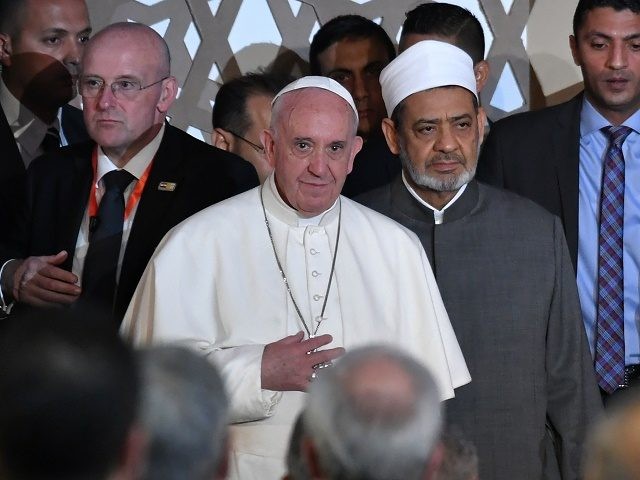In his sternest address to date on the issue of violence perpetrated in the name of God, Pope Francis condemned all attempts to justify violence that “masquerades” as holiness.
Without mentioning radical Islam by name, Francis began his speech at the Al-Azhar Conference Centre in Cairo with the Arabic greeting “As-salamu alaykum!” and his words had evident overtones for his mostly Muslim audience. Egypt was rocked this month by two jihadist attacks on Christian churches on Palm Sunday, which left at least 45 dead and 126 injured.
Speaking at an International Peace Conference at the invitation of the Grand Imam of Al-Azhar, Francis pulled no punches in what analysts are referring to as his version of the “Regensburg Address” given by Pope Benedict XVI in 2006. In that watershed speech, Benedict spoke on the proper relationship between faith and reason and cited a medieval scholar who linked the prophet Mohammad with spreading religion by the sword.
Wisdom, Francis said Friday, “learns that evil only gives rise to more evil, and violence to more violence, in a spiral that ends by imprisoning everyone.”
Reiterating his conviction that “the future also depends on the encounter of religions and cultures,” Francis said that “the only alternative to the civility of encounter is the incivility of conflict; there is no other way.”
“To counter effectively the barbarity of those who foment hatred and violence, we need to accompany young people, helping them on the path to maturity and teaching them to respond to the incendiary logic of evil by patiently working for the growth of goodness,” he said.
In this context, the Pope spoke of what he sees as “a dangerous paradox of the present moment” where in some culture “religion tends to be relegated to the private sphere, as if it were not an essential dimension of the human person and society,” while in other cultures “the religious and political spheres are confused and not properly distinguished.”
To those who would denounce faith as the cause of conflicts, Francis said that “religion is not a problem but a part of the solution.”
Against “the temptation to settle into a banal and uninspired life,” he said, “where everything begins and ends here below, religion reminds us of the need to lift our hearts to the Most High in order to learn how to build the city of man.”
During his speech, the pope returned again and again to the question of violence carried out in God’s name, which he denounced in the strongest of terms, insisting that “we reject any ‘absolutizing’ that would justify violence.”
Violence, he said, “is the negation of every authentic religious expression.”
The pontiff also called on religious leaders themselves to “unmask the violence that masquerades as purported sanctity and is based more on the ‘absolutizing’ of selfishness than on authentic openness to the Absolute.”
All religious leaders have an obligation to denounce violations of human dignity and human rights, he said, and to “condemn” attempts to justify hatred in the name of religion, which are “idolatrous caricatures of God.”
“Peace alone, therefore, is holy and no act of violence can be perpetrated in the name of God, for it would profane his Name,” he said.
Pope Francis urged his fellow religious leaders to take a strong and public stand against violence perpetrated in the name of their respective faiths.
Let us say once more “a firm and clear ‘No!’ to every form of violence, vengeance and hatred carried out in the name of religion or in the name of God,” Francis said. “Together let us affirm the incompatibility of violence and faith, belief and hatred. Together let us declare the sacredness of every human life against every form of violence, whether physical, social, educational or psychological.”
Unless it is born of a sincere heart and authentic love towards the Merciful God, he added, “faith is no more than a conventional or social construct that does not liberate man, but crushes him.”
On Saturday, Pope Francis will continue his Cairo visit, beginning the day with the celebration of a public Mass at 10:00 a.m., followed by meetings with the local Catholic community.
Follow Thomas D. Williams on Twitter Follow @tdwilliamsrome

COMMENTS
Please let us know if you're having issues with commenting.